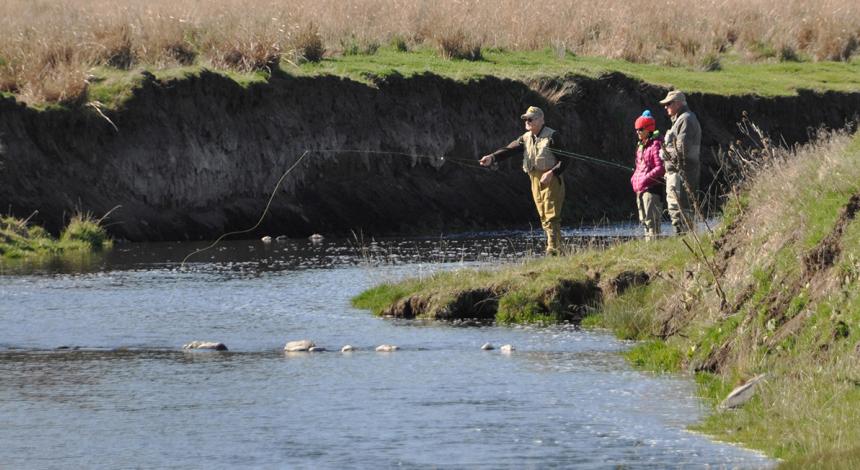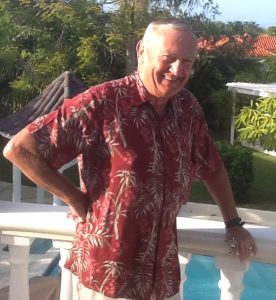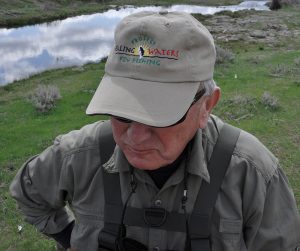Service on Sea & River

Chuck was a platoon leader in Vietnam.
In one battle, his unit was pinned down, surrounded by a North Vietnamese Army regiment. Chuck (not his real name) called in a request for an Arc Light Strike, a desperation move that would rain bombs on friendly and unfriendly soldiers alike.
Chuck escaped. Many of his men did not.
Some 40 years later, Chuck was one of the first veterans to participate in Spokane’s Project Healing Waters Fly Fishing, a nonprofit organization that seeks to support wounded and disabled veterans through flyfishing.
Norm Scott ’63, a fellow Vietnam veteran, had recently taken leadership of the Spokane program as a project in his retirement.
He and Chuck had been fishing on the Coeur d’Alene River.
“On the way back, Chuck looked at me and said, ‘Why me? Why are you doing this for me?’” Scott recalled. “’Why am I still here? Why me, when I lost all those guys?’”
“When he tells me, ‘If it weren’t for you, this organization, I wouldn’t be here,’ — the dark side had almost gotten to him — that really, really grabbed me,” Scott said. “One of the things that concerns me is the suicide rate, not only among active duty, but veterans. If I can do anything to prevent that sort of stuff from happening, that’s why I’m in the program.”
Scott grew up in Eastern Oregon, a fishing rod in his hand. Recruited to Pacific University by then-Dean Charles Trombley, he was the first in his family to go to college, spending his college years studying biology and enjoying exploits with his Alpha Zeta Fraternity brothers.

As graduation approached, though, he knew the Army would be on his heels.
“I knew as soon as I stepped out of school, I was going to be in the Army,” he said. “And I knew I did not want to go into the Army at the time — this was ’63.”
He went to Oregon State University, where he met students in various ROTC programs and decided that the Navy’s officer procurement program would be a better option than the Army draft.

“I thought, ‘Well, I’ll spend my three years,’” he said. “I found myself the whole time in Vietnam.
“I didn’t necessarily like what I was doing in Vietnam, but I did like the responsibility and the options available to me at the time,” he said.
And so he stayed.
“I kept going from one assignment to another. I was ahead of my peers, getting early promotions. I was getting jobs that were, in my mind, very important and a step up,” he said. “I had my first command when I was under 40.”
Norm Scott
Over a 30-year career, Scott held a variety of command positions, on ships and on shore. He spent two years with the AEGIS Shipbuilding Program, an assignment on the Atlantic Fleet Propulsion Examining Board, and a tour as a commanding officer of the USS Gallery, a guided missile frigate, and the USS Gridley, a guided missle cruiser. He closed out his military career as commander of the Naval Surface Warfare Center at Dahlgren, the Navy’s largest Surface Ship Research and Development organization.
“That was a very rewarding tour,” he said. “It was interesting being in that type of environment, R&D, providing new programs, researching new things in a wide variety of areas, all related to the surface Navy.”
Throughout his career, Scott had the support of his wife, fellow Pacific University alumnus Cheryl (Gillis) ‘65. They married after he returned from Vietnam and together decided to continue the Navy life while raising a family.
“It was a lot of separation, a lot of time at sea, away from the family. We both learned to endure that, as did a lot of other military families in the same situation,” he said. “But Cheryl and I weighed things. It was always a family decision.”
After he retired from the Navy, the Scotts got into the hospitality business, owning a resort in Camp Sherman, Ore., for several years, until Scott returned to consulting and then running an engineering office in Virginia. When he finally retired from his civilian career, they settled in Spokane, where he soon got involved in Project Healing Waters Fly Fishing.
The national organization was started by one of Scott’s friends, who met a pair of wounded Navy guys at Bethesda Naval Hospital near Washington, D.C.
“By doing things like fishing or horseback riding, they can focus on something other than their ills and aches and pains.”
“They were amputees, badly damaged. They got to talking and he found out they liked to fish,” Scott said. “He wanted to take them out fishing to get them out of the hospital.”
"By doing things like fishing or horseback riding, they can focus on something other than their ills and aches and pains."
Red tape stood in the way at first, but the friend was able to make arrangements to start a project with Walter Reed Army Hospital. Soon, it grew. When the Scotts headed to Spokane, Scott’s friend told him to get involved with the local program.
It took a few years to get things going, but Scott soon built up the local organization. He got it featured in the local newspaper, and on the cable TV program Trout TV.
The individual stories he heard, though, were what kept him going.
“The veterans of today, what they’ve gone through, I would characterize as being totally different from what we older veterans went through back in the day,” he said. “These young people coming out of Iraq and Afghanistan after multiple deployments, their lives have been formed in a manner most of us don’t want our lives formed.
“I remember coming home from Vietnam and going through stuff, but it’s not the same as what these young people faced.”
Norm Scott has recently handed the reins of Project Healing Waters Fly Fishing in Spokane over to a new leader, but he continues to support programs like it, hoping they can offer help for those who need it.
“By doing things like fishing or horseback riding, they can focus on something other than their ills and aches and pains,” he said.
He remembers a young man who was partially paralyzed and had a traumatic brain injury from an IED in Iraq who took part in the program, eventually earning a master’s degree and going to work as a wounded warrior advocate for the VA.
Another who had been shot nine times by an AK-47 in Iraq found fishing gave him a distraction from his daily pain. Eventually he and his wife had a baby, and his family took up his fishing time.
Yet another was injured in a suicide bombing in Iraq, almost killed and left with significant long-term injuries.
“But we got him out fishing. He stuck with it, then got involved in the Wounded Warrior Project,” Scott said.
“It’s rewarding to watch them pull themselves up and forget the past a bit.”■
This story first appeared in the Summer 2016 issue of Pacific Magazine. For more stories, visit pacificu.edu/magazine.


